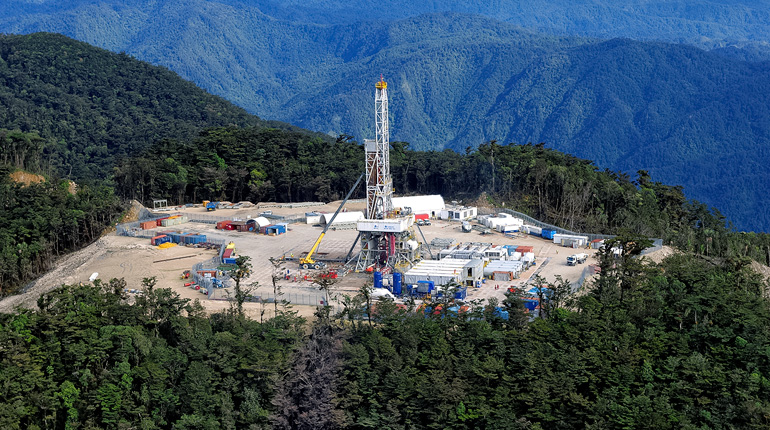 Gas is supplied to PNG LNG from Hides in Papua New Guinea’s Central province. (Santos)
Gas is supplied to PNG LNG from Hides in Papua New Guinea’s Central province. (Santos)
Local landowners in Papua New Guinea have threatened to shut off gas supply to the PNG LNG facility because they have not been paid royalties promised by the government, but experts think they are unlikely to carry out their threat.
A group of disgruntled landowners gathered on Monday at the Hides gas conditioning plant in Central province, which supplies gas to the PNG LNG project outside Port Moresby, the Papua New Guinea Post Courier reported.
Initial reports suggested they had restricted access to the site, but a statement from ExxonMobil on Tuesday said the plant continued to operate normally with personnel moving freely. Exxon has urged for a swift and peaceful resolution to the dispute.
Government officials, including the chief secretary and finance minister, met the landowners on Friday, but negotiations proved inconclusive and are set to continue over the weekend, according to the PNG Post Courier.
The government has blamed its delays in paying the royalties on the need to vet claims for compensation to ensure they are genuine.
However, the landowners have been waiting five years for the royalties and for infrastructure development grants they were promised when construction started on the project. They are worth millions of dollars and will contribute to the development of the Central region.
In response to the protests, Papua New Guinea Petroleum and Energy Minister Nixon Duban announced that a time limit of 30 days will be set to complete the vetting process for landowners in the region. However, the process is in the hands of the Alternate Dispute Resolution court and Duban has no power to release the funds, according to news outlet One Papua New Guinea.
It is unclear whether this will appease the protesters, who threatened to invade the facility and switch off the gas supply to the LNG plant if their demands are not met by the end of the week.
However, a spokesperson for consultancy Wood Mackenzie told Interfax Natural Gas Daily the landowners would be unlikely to escalate the situation by impeding the project.
"It will be a bit of a surprise if it does come to the stage where production is shut in. It is in no one’s best interest for that to occur, so we expect an agreement to be reached between the government and the landowners," the spokesperson said.
Papua New Guinea has a robust legal system for dealing with these kinds of disputes, according to Steven O’Brien, senior partner at law firm O’Briens based in Port Moresby. He also said he did not expect the protesters to go as far as to turn off the gas.
"Whatever their claims are we expect they will be solved by negotiation or dispute resolution processes," he said.
"These sorts of claims are not uncommon as the government needs to determine who the correct beneficiary parties are. There are very detailed legislative provisions to do this and recourse to dispute resolution processes if there is disagreement," he added.
Despite the relatively frequent nature of these stand-offs, the government has posted additional police to the region, showing that it is concerned by the threat posed by the protesters to the plant, which is the country’s largest source of revenue.
Royalties owed
Payments to landowners in other regions of the country will follow once their respective vetting processes are complete.
There is PGK 135 million ($42.6 million) of royalty funds, and the same amount in business development grants, held at the Central Bank, while a further PGK 200 million ($60 million) is held by the Mineral Resources Development Co. (MRDC), according to PNG Facts, a local news source.
The MRDC holds a 2% stake in the PNG LNG project and is supposed to represent the landowners affected by the production, transport and end-use of the gas.
The PNG LNG project has been very successful, starting production three months ahead of schedule in May 2014. The project has offtake contracts with Sinopec, Taiwan’s CPC, Osaka Gas and Tepco, while South Korea purchases a number of its excess cargoes on the spot market.
If the protesters do disrupt gas supply to the plant it could force Exxon to declare force majeure on its LNG contracts, but this would depend on the length of and severity of the disruption to supply.
The companies holding contracts would be forced to find replacement cargoes on the spot market, which could cause prices to rise. However, there is plenty of supply in the region, with new projects starting up in Australia that have struggled to find buyers for their commissioning cargoes in an oversupplied market.







Talk to us
Natural Gas Daily welcomes your comments. Email us at [email protected].